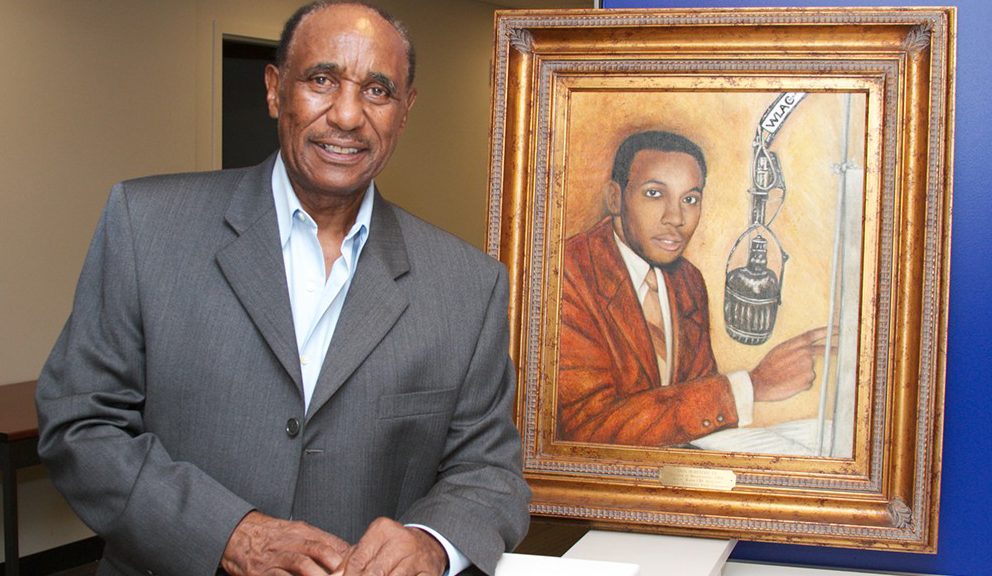NASHVILLE, Tenn. (TSU News Service) – Tennessee State University’s Communications Department is honoring a pioneer in news radio broadcasting: TSU alum Don Whitehead.

The department is creating a documentary about Whitehead, the first African-American hired as a full-time announcer at Nashville-based WLAC, a clear channel radio station whose signal during its early years reached most of the Eastern and Midwestern United States, in addition to southern Canada and the Caribbean.
“Don Whitehead was the first African-American to work with a station with that reach and that is a CBS affiliate,” said Joe Richie, director of TSU’s Center for Media Arts and Production.
After studying drama and receiving a bachelor’s degree from Tennessee State in 1967, Whitehead continued his studies at the historically black college, hoping to earn a master’s in theater.
But he was soon informed by the then-dean of TSU’s Arts and Sciences Department that he had been chosen to speak with representatives of WLAC. After about three meetings, he agreed to take the position as radio broadcaster.
His hiring came at a critical time in American history: shortly after the assassination of Dr. Martin Luther King, Jr. in 1968.
It wasn’t long before Whitehead was approached by WLAC sales manager E.G. Blackman, who told Whitehead that he was going to have a new assignment. Due to the racial unrest in the southern states – where the majority of the station’s listeners lived – Blackman and other station associates decided to use Whitehead to reach out to the black community.
Whitehead broadcasted from historically black colleges across the southern U.S., encouraging African-American youth to attend school. He was on his way to becoming a prominent part of WLAC’s rich history.
In the late 1940s, when country music became a big business, WLAC added early-morning and Saturday-afternoon shows. But historians say it was the station’s quartet of nighttime rhythm and blues shows in the 1950s, 60s and 70s that made it legendary. WLAC described itself as the nighttime station for half the nation with African-American listeners, especially in the Deep South, as the intended audience of the programs.
“WLAC had a 50,000-watt clear signal that bounced across the stratosphere as the most powerful force in R&B broadcasting in America,” said Michael Gray, the Country Music Hall of Fame and Museum’s editor. “The influence WLAC wielded in America during the Nashville station’s heyday from the late 1940s until the early 1970s can hardly be overstated.”
In 1980, WLAC changed its format to news and talk, and is currently the Nashville home for several popular conservative talk shows. However, the station’s early history and Whitehead’s influence have not been forgotten.
The Country Music Hall of Fame and Museum included Whitehead in its 2004-05 major exhibition, Night Train to Nashville: Music City Rhythm & Blues, 1945–1970.
“He … played a considerable, unique role in covering the era’s conflicts,” Gray said of Whitehead, who was a WLAC radio broadcaster for nine years before signing on with WLAC-TV in sales and advertising. “We appreciate the personal insights and perspectives he offered our visitors during related educational programs.”
Last year, Richie and Brian Day, assistant professor of film and TV production at TSU, traveled to Georgia to meet and interview Whitehead.
“After spending the afternoon with Don, I felt that his personality and story would make a compelling documentary,” Day said. “I hope to have the film wrapped up by the end of the summer/start of the fall. My plan is to submit it to film festivals and then to PBS.”
Richie said the department also plans to launch a campaign this summer to set up a $25,000 foundation scholarship in Whitehead’s name.
Department of Media Relations
Tennessee State University
3500 John Merritt Boulevard
Nashville, Tennessee 37209
615.963.5331
About Tennessee State University
With more than 9,000 students, Tennessee State University is Nashville’s only public university, and is a comprehensive, urban, co-educational, land-grant university offering 38 undergraduate, 25 graduate and seven doctoral programs. TSU has earned a top 20 ranking for Historically Black Colleges and Universities according to U.S. News and World Report, and rated as one of the top universities in the country by Washington Monthly for social mobility, research and community service. Founded in 1912, Tennessee State University celebrated 100 years in Nashville during 2012. Visit the University online at tnstate.edu.
